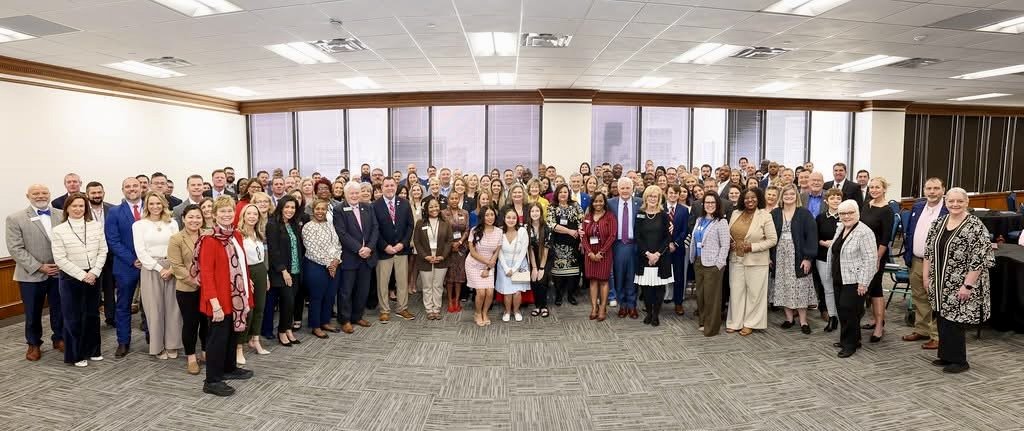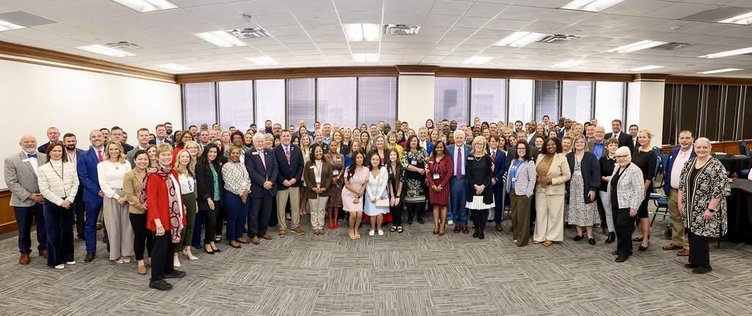Effingham County made history with its largest-ever delegation to Effingham Days at the Capitol, held on February 9–10, 2025, in Atlanta. More than 150 community stakeholders representing business, government, education, and civic leadership traveled 500 miles round trip to participate in this premier advocacy event.
The event, presented by the Effingham County Chamber, was made possible through the generous support of the Effingham County Industrial Development Authority as the Community Partner and Presenting Sponsor, alongside Premier Partners Effingham Health System, Goodwyn Mills & Cawood, Trammell Crow, and several others. Their contributions ensured that this year’s event provided unparalleled opportunities for engagement with state leaders and advocacy for Effingham’s priorities.
Throughout the two-day experience, attendees engaged directly with state legislators, industry leaders, and policymakers to discuss critical issues shaping Effingham’s future, including economic development, workforce attraction, infrastructure, and taxation policies. Among the distinguished legislative guests were Speaker of the House Jon Burns, Senator Billy Hickman, and Representative Bill Hitchens, each of whom reaffirmed their commitment to supporting Effingham County’s continued growth and success.
A key highlight of the event was the Leadership Effingham Class of 2025’s project presentation, showcasing strategic initiatives to enhance community assets, boost tourism, and strengthen workforce retention efforts. Additionally, Effingham County Manager Tim Callanan provided a comprehensive overview of HB 581, clarifying its impact on property tax protections for local homeowners.
Adding to the significance of the event, students from the Effingham County High School Interact Club participated in the Day at the Capitol experience, engaging with state officials, observing legislative proceedings, and gaining firsthand insight into the policymaking process. Their involvement emphasized the importance of civic engagement among the next generation of leaders and highlighted the strong connection between Effingham’s educational institutions and statewide governance.
This year’s Effingham Days at the Capitol not only strengthened relationships between local leaders and state officials but also solidified Effingham’s voice in shaping Georgia’s legislative and economic landscape—ensuring the county’s continued growth, investment, and prosperity.
Leadership Effingham Unveils Community Projects at Effingham Days at the Capitol
During the launch of Effingham Days at the Capitol, held on Sunday, February 9, and Monday, February 10, members of the Leadership Effingham Class of 2025 presented their class project selections just three sessions into the eight-month program. This presentation aligned seamlessly with the Effingham County Chamber’s mission, vision, and values, reinforcing strategic investments in tourism, attraction development, and community enhancement.
The 17-member class, representing a cross-section of local businesses and interests, selected these projects with a shared commitment to economic growth, quality of life improvements, and workforce retention. Their efforts also align with the Effingham County Board of Commissioners' substantial investments in parks and recreation, further strengthening the county’s appeal to residents and prospective businesses.
One of the core themes of the presentation was workforce recruitment and retention, particularly in high-demand sectors such as healthcare and education. Connie Lau, a Leadership Effingham participant representing Effingham Health System, shared a compelling case study on the challenges of physician recruitment.
During a community tour with a potential recruit from Detroit, Lau found that while the physician loved the area, he raised concerns about the availability of cultural amenities, grocery options, educational resources, and recreational spaces. His feedback underscored the importance of continued community investments to attract top talent.
Recognizing that recruitment efforts span multiple industries, class participant Tiffany Altman, Communications Coordinator for Effingham County School District, highlighted the need for collaborative efforts across sectors.
"When we recruit teachers, we aren’t just asking them to take a job—we’re asking them to put down roots in Effingham County," Altman noted. "By working together, we can provide a comprehensive picture of what our community has to offer."
The desire for cross-sector engagement drove the class project selections, all of which focus on strengthening Effingham’s appeal.
Community Enhancement Projects
The class introduced a series of short- and long-term projects designed to enhance quality of life, boost economic development, and support local tourism efforts:
- Effingham Welcome Sign Initiative – The proposed installation of six new entryway signs at key county access points to reinforce Effingham’s identity and civic pride.
- Story Walk at Pineora Park—This bilingual, literacy-focused outdoor experience, created in partnership with the Live Oak Public Library, allows families to engage with books while enjoying a scenic walk.
- Support for the expansion of parks and trails – The introduction of the Truman Trail, a bike and walking path that runs parallel to Pineora Park, provides new recreational opportunities for residents and visitors.
These projects align with the Chamber’s revitalized focus on tourism and attraction development, ensuring that Effingham County remains competitive as a destination for families and businesses.
"Together, we are dynamically powerful," said MI Global’s Miller Bargeron, a Leadership Effingham participant and presentation moderator. "Individually, we are strong, but by working together, we can make Effingham County the best and most beautiful county possible."
Effingham County Chamber CEO Susan Kraut echoed these sentiments, calling on Leadership Effingham alumni to engage long-term with these initiatives and help drive community progress.
Expanding Parks and Recreational Opportunities
One of the most visible signs of Effingham County’s growth is its ongoing investment in parks and recreation. With the county’s population steadily increasing, expanding outdoor spaces, walking trails, and sports facilities has become a top priority.
County Manager Tim Callanan confirmed that trail connectivity and green spaces remain central to the county’s long-term planning efforts.
“We recognize that people moving to Effingham aren’t just looking for a place to live—they’re looking for a place to enjoy life,” Callanan noted. “That means investing in parks, trails, and public spaces that enhance quality of life and support a more active community.”
The county is evaluating several opportunities to enhance existing parks and develop new recreational spaces, ensuring that residents of all ages have greater access to outdoor activities and community gathering places, including the highly anticipated development of Atlas Park as a regional recreational attraction.
Transportation and Roadway Improvements: Managing Growth Responsibly
With Effingham County experiencing rapid population growth, road congestion and infrastructure development have become critical concerns. Callanan detailed the county’s approach to strategic roadway improvements to ease traffic congestion and support continued economic development.
Key projects include:
- Intersection Upgrades – The county is actively working with state and regional transportation agencies to improve major intersections, particularly along Highway 21 and key connector routes.
- Road Widening Initiatives – Expansion efforts on high-traffic corridors aim to accommodate increased traffic flow while ensuring safer travel conditions.
- Long-Term Transportation Planning – Callanan emphasized that while road improvements take time, collaborative planning with the Georgia Department of Transportation (GDOT) and local municipalities will help ensure that Effingham’s infrastructure keeps pace with growth.
"One of the biggest challenges in fast-growing communities is keeping up with infrastructure demands,” Callanan said. “Our job is to ensure growth happens in a responsible, planned-out manner, not in a way that overwhelms our roadways and services."
$3.2 Million State Budget Investment in Water and Sewer Infrastructure
Beyond parks and roadways, Callanan also highlighted a significant win for Effingham County in the state’s 2025 proposed budget—a $3.2 million allocation for the county’s water and sewer treatment plant expansion.
This funding represents a significant investment in ensuring Effingham can support new residential, commercial, and industrial development without overburdening existing infrastructure.
"Water and sewer infrastructure is one of the most important aspects of growth planning,” Callanan emphasized. “Having state support for this project will ensure we can continue attracting new businesses and residents while maintaining reliable utility services for those who already call Effingham home."
Effingham currently relies on two primary water sources:
- Groundwater from the Floridan Aquifer
- Surface water from the Abercorn Creek supply, sourced through the City of Savannah
Expanding local water treatment capacity will be critical to sustaining the county's population growth while reducing dependence on outside sources.
Callanan noted that collaboration with state leaders—including Speaker Jon Burns, Senator Billy Hickman, and Representative Bill Hitchens—was instrumental in securing the funding.
"This is the kind of strategic investment that positions Effingham for long-term success,” Callanan said. “It ensures that we have the infrastructure not just for today but for the next generation of growth."
A Balanced Approach to Growth and Infrastructure
Callanan’s presentation underscored the county’s commitment to smart, sustainable growth, ensuring that Effingham remains a desirable place to live, work, and do business.
His key message? Growth is inevitable, but how Effingham grows is a choice.
"Effingham County is in a position of incredible opportunity,” Callanan stated. “We’re seeing record economic development, expanding infrastructure, and new community investments—but we have to be intentional about how we manage that growth. By investing in the right projects, in the right places, we can shape the future of Effingham in a way that benefits everyone.”
As Effingham County moves forward, residents can expect continued investments in parks, transportation, and infrastructure, ensuring that growth enhances—not strains—the quality of life in the community.
Effingham Leaders Engage with State Officials on Day Two of Capitol Visit
The second day of Effingham Days at the Capitol, held on Monday, February 10, provided the delegation with a deeper understanding of statewide efforts to support Effingham County’s growth and economic development. Participants engaged in high-level discussions with key state officials, focusing on transportation, agriculture, education, and natural resource management.
The day’s agenda included a strategic briefing with Ann R. Purcell, Chair of the Georgia State Transportation Board and representative of the 1st Congressional District, where she provided critical updates on transportation investments and infrastructure projects impacting Effingham County.
The delegation also met with Agriculture Commissioner Tyler Harper, Education Chairman Chris Erwin, Department of Natural Resources Commissioner Walter Rabon, and others, engaging in discussions on statewide initiatives supporting Effingham’s economic growth, workforce development, and conservation efforts. The day concluded with a visit to the Georgia State Capitol, where participants observed a live legislative session and took part in a guided tour led by Mrs. Dayle Burns, whose deep knowledge and passion for Georgia’s legislative history provided an insightful and engaging experience.
Agriculture’s Impact on Effingham County: Commissioner Tyler Harper Highlights Industry Growth and Challenges
Agriculture, Georgia’s largest industry, took center stage during the morning session as Commissioner of Agriculture Tyler Harper addressed the Effingham delegation. Harper, a lifelong farmer and advocate for agricultural sustainability, emphasized Effingham County’s role in training the next generation of farmers and agribusiness leaders.
“I was just in Effingham this past fall for the ribbon-cutting at Honey Ridge AgriCenter,” Harper shared. “It’s an incredible opportunity for young people in your county to gain hands-on experience in agriculture, which remains Georgia’s number one industry. Investments in agriculture education like this will create lasting benefits for students and the local economy.”
Hurricane Idalia’s Impact and Recovery Efforts
Harper also discussed the devastation caused by Hurricane Idalia in 2023, which resulted in $5.5 billion in agricultural losses across Georgia, wiping out nearly one-third of the state’s agricultural economy. He reassured attendees that the Georgia Department of Agriculture continues to secure resources to help farm families recover, ensuring that Georgia’s farmers can rebuild and continue to contribute to the state’s economy.
Protecting Georgia’s Poultry Industry
A significant concern for Georgia’s agricultural sector is the recent avian influenza outbreak detected at a commercial poultry farm in Elbert County. Harper explained that the department acted immediately, placing 128 farms within a 10-kilometer radius under quarantine to prevent the virus from spreading.
“Georgia is the number one poultry-producing state in the country, with a $30 billion industry,” Harper stated. “We took every step necessary to protect farmers, businesses, and consumers who rely on this vital sector.”
Investing in the Future: Education Chairman Chris Erwin Discusses Literacy, School Safety, and Growth Challenges
Education remains a top priority for Georgia lawmakers, and Chairman of the House Education Committee Chris Erwin provided the Effingham delegation with key updates on literacy initiatives, school safety, and capital investments to support the county’s rapid growth.
Building a Strong Literacy Foundation
Erwin highlighted HB 538, a recently passed bill aimed at improving literacy rates by integrating the science of reading into early education. Effingham County Superintendent Dr. Yancy Ford is actively involved in this initiative, serving on the Georgia Literacy Council to help implement these strategies at the local level.
“Students who are reading on grade level by third grade have significantly higher success rates,” Erwin explained. “Our goal is to ensure every child has the foundation needed to thrive academically and professionally.”
Addressing Growth and School Infrastructure Needs
Effingham’s rapid population growth is placing increased pressure on local schools, with rising student enrollment creating a demand for new facilities and expanded resources.
“We know Effingham needs additional funding to accommodate new students,” Erwin acknowledged. “We’re committed to securing the necessary capital investments to support your schools and ensure that growth is managed effectively.”
Enhancing School Safety and Student Support
In addition to academic improvements, Erwin outlined a comprehensive 50-page school safety bill, designed to proactively address threats to student well-being. The legislation includes:
· Expanded mental health support for students
· Increased funding for social workers and counselors
· Enhanced threat assessment protocols to identify and mitigate risks before they escalate
“These measures ensure that our schools remain secure environments for learning, while also providing mental health and emotional support for students,” Erwin said.
With a focus on literacy, school infrastructure, and safety, Erwin’s presentation underscored the state’s commitment to strengthening education in fast-growing communities like Effingham County.
Georgia’s Natural Resources: Conservation, Public Lands, and Disaster Response
Protecting Georgia’s wildlife, parks, and natural resources is a critical priority, and Department of Natural Resources (DNR) Commissioner Walter Rabon provided the Effingham delegation with a comprehensive overview of statewide conservation efforts and environmental management initiatives.
DNR is responsible for over 1 million acres of public land used for hunting, fishing, and recreation. The agency also manages:
· Georgia’s 105-mile coastline, which contains one-third of the East Coast’s salt marshes and plays a crucial role in coastal resilience and marine ecosystems.
· 65 state parks, offering diverse outdoor experiences ranging from the mountains of North Georgia to the coastal plains.
Chronic Wasting Disease (CWD) in Georgia’s Deer Population
Rabon addressed the first-ever confirmed case of Chronic Wasting Disease (CWD) in Georgia’s deer population. CWD is a fatal neurological disease affecting deer, elk, and moose in several states, and its recent detection has raised concerns among hunters and wildlife managers.
“This is not the end of deer hunting in Georgia,” Rabon reassured attendees. “Our deer herd remains healthy, and we are conducting increased testing and monitoring to prevent further spread.”
DNR is working closely with wildlife experts and conservation partners to manage the disease and educate hunters on best practices for maintaining a sustainable deer population.
DNR’s Role in Disaster Response
Beyond conservation efforts, DNR’s law enforcement division plays a key role in emergency response throughout the state. Officers assist with hurricane recovery, flood response, and other natural disasters, including those that have affected Effingham County in recent years.
The agency’s ability to mobilize resources and personnel quickly is vital in protecting both natural environments and communities during times of crisis.
Effingham Delegation Visits the Georgia State Capitol
Following the morning meetings, the delegation traveled to the Georgia State Capitol, where they observed a live legislative session and met with state lawmakers. Attendees gained valuable insight into the legislative process and the decision-making that impacts Effingham County’s growth and development.
This experience underscored the importance of collaboration between state leaders and local officials. The discussions - from infrastructure and economic development to agriculture and education - reinforced Effingham County’s growing influence in state policymaking.
Effingham leaders left Atlanta with a stronger network of state-level advocates and a clearer understanding of the policies and resources shaping the county’s future. As Effingham continues to expand, events like these ensure that local priorities remain at the forefront of Georgia’s legislative agenda.
Sidebar: County Manager Tim Callanan Explains HB 581 and Property Tax Protections
Understanding HB 581: What Homeowners Need to Know
Effingham County Manager Tim Callanan followed with an update on HB 581, a statewide property tax reform law to prevent dramatic tax increases due to rising home values. The measure was approved by 66% of Effingham voters in November and limits annual taxable home value increases to the rate of inflation.
However, Callanan emphasized that Effingham County already has stronger tax protections in place through the Carter Burns Act, enacted in 2008. Unlike HB 581, which follows inflation, Carter Burns caps taxable home value increases at 3% annually, ensuring even greater savings for local homeowners.
Key Takeaways for Effingham Homeowners
1. Effingham County has better tax protections than HB 581
· The Carter Burns Act caps taxable home value increases at 3% annually, regardless of inflation.
· In 2022, inflation was 8%—if HB 581 had been in place, taxable values would have increased by 8%. Under Carter Burns, they were limited to just 3%, saving homeowners thousands over time.
2. Effingham County is not opting out of HB 581—but Carter Burns will remain in effect
· Since Carter Burns is more advantageous, Effingham homeowners will continue to receive the better exemption.
· “Effingham is one of the most tax-friendly counties in Georgia,” Callanan noted. “With low millage rates and strong exemptions, our property tax system ensures affordability for long-term residents.”
3. How much are homeowners saving?
· In 2023, $950 million in property value was exempted from taxation in Effingham County under Carter Burns.
· On average, 20% of a home’s value is exempt from taxation due to this law.
· For long-term homeowners, the exemption can be as high as 60% of the home’s value.
4. What happens when you sell your home?
· If you sell your property, the assessed value resets to the market rate for the new buyer.
· New homeowners may initially see less exemption, but Carter Burns will limit tax increases over time, protecting long-term affordability.
Callanan assured residents that Effingham County will continue to prioritize affordability, combining smart tax policy with infrastructure investments to support economic stability and responsible growth.








